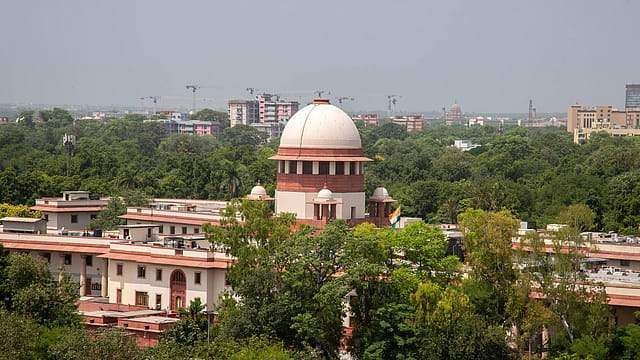Supreme Court strikes down electoral bond scheme
ADVERTISEMENT

The Supreme Court on Thursday struck down the electoral bond scheme which allows donors to anonymously buy electoral bonds and send funds to a political party.
Terming the scheme introduced by the BJP-led central government as "unconstitutional", the top court has directed the State Bank of India (SBI) to stop issuing electoral bonds with immediate effect.
The apex court has ordered state-run SBI to share the records of electoral bonds issued in the past with the Election Commission of India (ECI).
SBI has been asked to issue details of the political parties which received electoral bonds and all the particulars received and submit them to ECI by March 6. SBI shall furnish bonds' purchase details with the date of purchase, name of purchaser and denomination, the order says.
The Election Commission of India has been told to publish these details on its website by March 13, 2024.
A five-judge Constitution bench of Chief Justice of India (CJI) DY Chandrachud and Justices Sanjiv Khanna, BR Gavai, JB Pardiwala and Manoj Misra delivered the unanimous verdict.
The electoral bonds scheme has been criticised by rights groups for facilitating quid pro quo as corporates were able to secretly bankroll political parties under the scheme.
January 2026
Netflix, which has been in India for a decade, has successfully struck a balance between high-class premium content and pricing that attracts a range of customers. Find out how the U.S. streaming giant evolved in India, plus an exclusive interview with CEO Ted Sarandos. Also read about the Best Investments for 2026, and how rising growth and easing inflation will come in handy for finance minister Nirmala Sitharaman as she prepares Budget 2026.
"The ability of a company to influence the electoral process through political contributions is much higher when compared to that of an individual," the top court says.
"A company has a much graver influence in the political process, both in terms of the quantum of money contributed to political parties and the purpose of making such contributions. Contributions made by individuals have a degree of support or affiliation to a political association. However, contributions made by companies are purely business transactions made with the intent of securing benefits in return," the Supreme Court states.
The top court held that the electoral bonds scheme due to its anonymous nature violates the right to information under Article 19(1)(a) of the Constitution.
Electoral bonds were introduced through the Finance Act, 2017 by amending the Companies Act, the Income Tax Act and the Representation of People Act. The court also held these amendments unconstitutional.
Former Reserve Bank of India governor Raghuram Rajan last year criticised the electoral bond scheme saying it is worse than cash in politics because the only people who know about the donations is SBI. "How much is kept secret in India? That's the question I want to ask. How much that the government knows who gave and to whom makes it an unequal form of funding because the government can always call up the people who gave the Opposition and say why you gave them," Rajan said in an interview last year.
"It is my worry that because it is non-transparent and Indian secrecy is not that strong gives an unfair advantage to the ruling party. The Opposition will have to use dirty cash. At the time of election, you raid the Opposition. How are elections fought? They are fought with money," Rajan said.
While the incumbent parties can get funding from cheques, the Opposition has to deal with bundles of cash, Rajan said, adding that this is not fair election process. Fundamentally, in a democracy not knowing who is funding whom is a vitiation of the process, he added.
